The Vocal Retrospective
June 2021
 |
Ralph Moore |
Mike Parr |
 |
A series of monthly musings by two members of the MusicWeb International review team who share a deep fascination with opera and vocal music in general. Each month we shall take a glance back at something of interest that appeared on commercial CD from the accumulated history of classical vocal recordings.
Christa Ludwig: in Memoriam
We honour the artistry of Christa Ludwig to mark her passing on April 24, 2021.
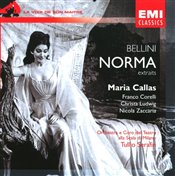 |
|
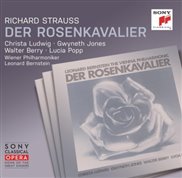 |
Ralph: Mike, when you and I decided to choose and contrast two of Christa Ludwig’s greatest recordings in honour of her recent passing, we came up with two very different from each other: you chose her Marschallin with Bernstein in Der Rosenkavalier; it is a novel choice, given that most people would first associate her with Octavian in Karajan’s classic version. On my part, I thought selecting her Adalgisa for Serafin’s 1960 Norma would make a slightly unusual and interesting contrast because, as I mentioned in my obituary of her she did not feel any great affinity with bel canto roles yet managed to produce what I consider to be one of the great recordings of that role.
Mike: I have to reluctantly admit that I have had a difficult time appreciating that recording of Norma for a number of reasons but chiefly because just like Ludwig I have long been of the opinion felt that there was something in her voice that did not quite mesh with the role. I preferred instead the Adalgisas of Marilyn Horne, Shirley Verrett, and Tatiana Troyanos. Our retrospective forced me to take a long hard listen after many years and I have to say that I now can find much more to enjoy in this recording and especially in Ludwig’s interpretation.
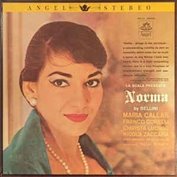 |
|
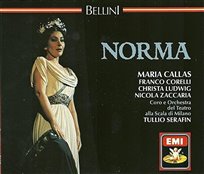 |
Ralph: Apparently, she learned the role in eight days following the cancellation for reasons of sickness by another mezzo – she did not know who and I would be interested to learn who that was if anyone out there knows. She came to the part with little experience of the genre and when she confessed her apprehension, Callas – always helpful and professional to colleagues she respected - simply advised her not to worry and to follow her lead. She certainly did that and there is no stylistic disjuncture between Callas’ style and Ludwig’s.
Mike: My speculation is that EMI might have planned to do it with Rita Gorr who was under contract to EMI France. The other possible candidate is Fiorenza Cossotto who was beginning to emerge as a major artist just at the time when this recording was made.
Ralph: The first thing to note in the Norma is the contrast between their voices: Callas’ is slightly frayed and unsteady in alt but suffused with that searing intensity distilled from a lifetime of struggle and suffering, while Ludwig is youthful, gleaming and steady, utterly even throughout its range. This might have resulted in some disharmony in their duets but in fact their blend is extraordinarily apt and moving from both a musical and a dramatic point of view, in that Callas’ Norma is a woman of stature, authority and some maturity, has already had two children by the philandering Pollione and now knows the pain of betrayal, whereas Adalgisa, whom Norma calls “my child”, is younger, naïve and only now having her eyes opened to Pollione’s duplicity. Ludwig was only 32 at the time of the recording and her hesitancy in undertaking the role while partnering a co-artist of Callas’ fame and experience probably helped her empathise with the character she was portraying. It matters little that the original Adalgisa was a soprano when the contrast and vocalism are as telling as they are here.
Mike: I was most immediately impressed with her opening recitative and scena, especially how she adds lovely dynamic shading and marvellous breath control at the first iteration of “perduta io son!”
Ralph: One of my favourite passages in all operatic music is the orchestral introduction to Adalgisa’s first aria. She has already intoned her recitative “Sgombra è la sacra selva” with stately beauty but the vibrancy and amplitude of her “Deh! proteggimi o Dio!” are thrilling; she then proceeds to delineate Adalgisa’s desperation with passion, plunging into her lower register to heart-rending effect on “perduta io son!” – and for a singer who professed not to specialise in Italian roles, her diction is crisp and sinewy, devoid of Teutonic solecisms. Of course, it does no harm that she is singing alongside two operatic immortals in Callas and Corelli but she can more than hold her own in such company. The core of her role lies in three extended duets, the first with Pollione and two with Norma, and the great trio concluding Act 1 (she is absent from the final Act).
Mike: For all of his thrilling tone I do find Corelli’s mannerisms hard to take in Bellini. Callas, even if less vocally splendid by this time is quite another matter.
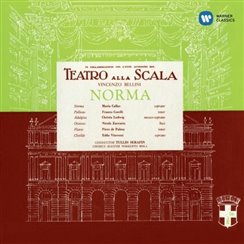 |
Ralph: The most prominent feature of Ludwig’s vocalism is her scrupulous adherence to maintaining legato and evenness, shadowing Callas’ own proficiency in that regard; they are as one in the coda to “Ah sì, fa core”. Nor does she quail in that superb trio “Oh di qual sei tu vittima”; she is a great singer among equals. The final duet “Mira, o Norma” and the cabaletta which conclude Act 2 constitute some of the most beautiful singing in opera; first they both sing softly with fine control, their voices entwine seductively in thirds, then in “Sì, fino all’ore” they abandon restraint and sing out fearlessly, yet still display all the agility and delicacy the coloratura divisions demand.
Mike: In the trio that closes Act One it is difficult for any Adalgisa to make an effect as her vocal lines tend to hide in the shadows of the other two singers, it is in the two duets with Norma where Ludwig really shines. One thing I find quite admirable is that in both scenes she gives a lesson in how to sing florid music without intrusively delineating each note with an aspirate “H”. That practice has been become rampant among singers in the last 40 years or so. Ludwig and Callas are demonstrating a vanished technique which urgently needs to be brought back into the vocal arsenal of the new generation of classical singers.
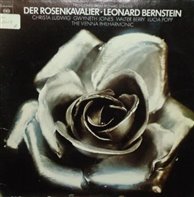 |
|
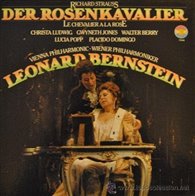 |
Ralph: It is quite a leap, in terms of time and genre, from Adalgisa in 1960 to the Marschallin in 1971, sung under Bernstein, one of the three conductors who guided and most influenced the development of Ludwig’s career. She had by now progressed – if that is the right term, as the roles are of equal importance – from Octavian, Count Rofrano, to Princess Marie Thérèse von Werdenberg, die Feldmarschallin.
Mike: The basis of this recording was a very well received production of the opera at the Vienna State Opera in 1968 with Bernstein and most of the same principals. By 1971, Lucia Popp had replaced Reri Grist as Sophie but otherwise the cast was intact. Bernstein was under contract to record for Columbia and he wanted to commit his Rosenkavalier to disc. Columbia didn’t have a European base from which to record so they choose to hire out an entire team of Decca engineers and producer, John Culshaw along with Decca’s cherished access to the Sofiensaal in order to record the opera in Vienna to the highest standards of the time. They had done this six years earlier with Bernstein’s version of Verdi’s Falstaff to the satisfaction of all concerned. Unfortunately, these sessions turned into a nightmare for everyone after Gwyneth Jones arrived in Vienna with a viral infection which required all of the sessions to be reshuffled around to allow her some time to recover. Some critics have complained that they can hear that she is unwell in the final product but I cannot really detect this myself when I listen to her Octavian. A few years later she would become an impressive Marschallin also.
Ralph: Mike’s admission that Ludwig is his favourite singer in the role of the Marschallin made me listen again with new ears and in many ways I fully appreciate Mike’s reasons for favouring her. The rich, dark timbre she possesses is suggestive of an older woman – at least older than the teenage Octavian, presumably being in her thirties. Let me here quote what I wrote about her assumption of the role in my survey of the opera:
“I like Ludwig's Marschallin almost as much as I do her Octavian; the slightly matronly smokiness in her tone makes her as apt as Crespin for the role, even if she doesn't have quite the same allure. Her voice is in top condition and despite the richness of her middle and lower range; the high notes come easily, too. She does not play with the words with the same subtlety as Schwarzkopf or Crespin but it's a grand performance.”
Mike: By the time this was recorded, Ludwig had performed the role in productions in Vienna, Salzburg, and New York. It should also be noted that she was still singing Octavian as well as the Marschallin. Her interpretation of the Marschallin had deepened and she had worked the role into her voice as one can tell by listening to the interesting but ultimately less recommendable live recording from the 1969 Salzburg Festival on DG under Karl Böhm. (DG 445338-2). I also really like Bernstein’s take on Rosenkavalier. I can sense the smile that would appear on his face every time a new waltz tempo creeps in. You can tell that he is really enjoying himself in conducting this music. He does make a few cuts though.
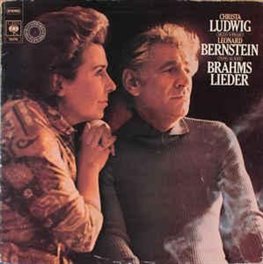 |
Ralph: Another listen has made me reconsider my observation about her treatment of the text. The core of the role surely lies in the Marschallin’s sombre reflections concluding Act 1, “Da geht er hin” and “Die Zeit, die ist ein sonderbar Ding”. I stand by my judgement that she is not quite as acute in her inflection of the words as Schwarzkopf, but nonetheless has crystalline diction and her voice is decidedly more beautiful, with fewer mannerisms – and when she ruefully asks, “Wie kann den das geschehn?” (How could this have happened?) we believe her. The deliberate slight tremulous quality in her tone in the Time aria is touching and lends a hint of desperation.
Mike: What I love about Ludwig’s Marschallin are the little touches she adds that enliven the character. For example, there is the delightful vignette of how she tells Octavian to hide himself behind the bed in Act One or the sarcastic wryness she puts into describing “a person of rank” to Baron Ochs in Act Three.
Ralph: I still think she could find more chill and mystery in the “stopping the clocks” passage and does “Hab’ mir’s gelobt” lie just a shade high for her? - but generally the quality of her singing is such as to defuse all complaint and “In Gottes Namen” and the simple “Ja, ja” are heart-stopping. Bernstein’s indulgent accompaniment and luscious playing from the VPO do everything to assist her.
Mike: Some people prefer Elisabeth Schwarzkopf’s ability to express the Marschallin’s quicksilver personality in Act One but I find that Ludwig does this nearly as well as Schwarzkopf and is a bit more natural and believable, for example she doesn’t overemphasize the “migraine” phrase to Ochs. She and Bernstein work so marvellously together and they paint quite the miniature tone poem in the sadness of “Die Zeit, die ist ein sonderbar Ding”. The entire concluding 30 minutes of Act One is simply enthralling.
Ralph: It is hard to think of a comparable artist who could so triumphantly encompass the demands of these two disparate roles yet also sing half a dozen Wagnerian ladies to perfection. She was one of a kind.
Vincenzo BELLINI
Norma (1831)
1960 (studio, stereo)
The Orchestra and Chorus of Teatro alla Scala/Tullio Serafin
Norma – Maria Callas
Adalgisa – Christa Ludwig
Pollione – Franco Corelli
Oroveso – Nicola Zaccaria
Clotilde – Edda Vincenzi
Flavio – Piero de Palma
Warner Classics 2564634084 [3 CDs: 161:00]
This recording is available on CD and for download from the Presto Classical Store or via the Qobuz Store. Streaming is also available from various sites such as Naxos Music Library or Spotify
Richard STRAUSS
Der Rosenkavalier (1911)
1971 (studio; stereo)
Vienna Philharmonic/Leonard Bernstein
Marschallin – Christa Ludwig
Octavian – Gwyneth Jones
Sophie – Lucia Popp
Baron Ochs – Walter Berry
Faninal – Ernst Gutstein
Marianne – Emmy Loose
Valzacchi – Murray Dickie
Annina – Margarita Lilowa
Italian Singer – Placido Domingo
Sony Classical 88843058662 [3 CDs: 213:00]
This recording is no longer available on CD. It is available for download from the Presto Classical Store or via the Qobuz Store. Streaming is also available from various sites such as Naxos Music Library or Spotify.



 All Nimbus reviews
All Nimbus reviews








